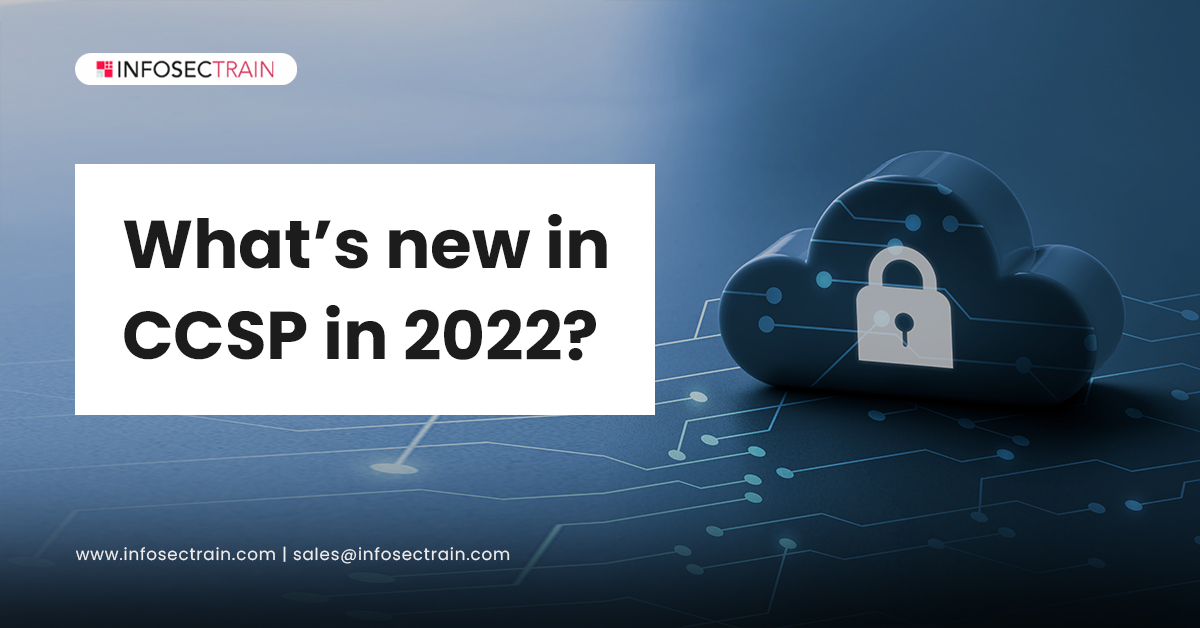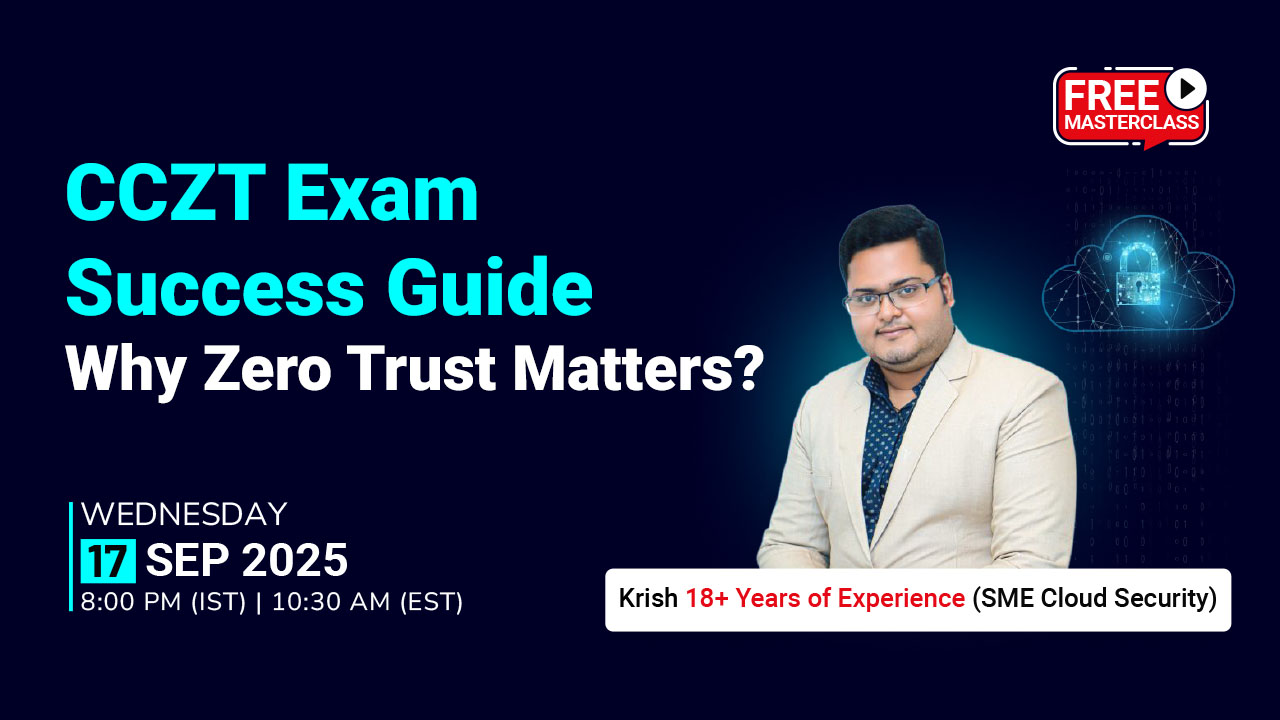What’s new in CCSP in 2022?
The Certified Cloud Security Professional (CCSP) is a vendor-neutral credential that reflects best practices in the cloud security field. This certification was designed by (ISC) 2 and the Cloud Security Alliance (CSA) to cover all current concerns and issues with cloud computing. After earning the CCSP credential, the applicant will have extensive knowledge and expertise in cloud security, including its design, operation, and service orchestration. The CCSP is a stand-alone credential that expands on and complements other educational programs and credentials, such as the CSA’s Certificate of Cloud Security Knowledge (CCSK) and the (ISC) 2’s Certified Information Systems Security Professional (CISSP).

Additionally, the ANSI (American National Standards Institute) has certified the CCSP certification, indicating that it satisfies the criteria of ANSI/IEC/ISO standard-17024.
Different CCSP Job Roles
- Cloud Architect
- Cloud Administrator
- Cloud Computing Analyst
- Cloud Operations Manager
The Advantages of CCSP
An indication of uniqueness: Unlike other certifications, the CCSP is backed by two respected non-profit organizations, the (ISC) 2 and the CSA.
Keeping up: The CCSP certificate can help candidates better understand cloud security practices and principles. Candidates who get this certification stay updated on changing technology, new strategies, and new dangers.
Versatility: Because the CCSP is a vendor-neutral certification, applicants can apply their expertise to various cloud systems.
Required experience
Candidates are expected to have a minimum of five years of IT work experience, of which three years should be in information security and one year of experience in any one of the domains.
By passing the CCSP test, a candidate who lacks the needed experience to become a CCSP can become an Associate of (ISC)2. After that, the Associate of (ISC)2 will have six years to complete the five years of experience required.
Different Job Opportunities for CCSP Professionals
Cloud Architect
An IT expert who oversees a company’s cloud computing strategy is known as a Cloud Architect. Planning for cloud adoption, cloud application design, and cloud management and monitoring are all included.
Cloud Administrator
A Cloud Administrator is a technical expert who manages their company’s cloud computing services. Your responsibilities as a Cloud Administrator include transitioning locally hosted infrastructure to the cloud, configuring cloud environments to match your company’s objectives, and architecting data management systems.
Cloud Computing Analyst
Cloud Analysts are in charge of planning and engineering cloud computing applications and services for a company. Cloud Analysts implement and design hardware and software that is solely cloud-based. As a Cloud Analyst, you also keep track of system performance.
Cloud Operations Manager
A Cloud Operations Manager’s responsibilities include managing the proper governance of the cloud platform, ensuring data security and compliance as per the organizational requirements, and ensuring various regulatory, legal, and compliance requirements are met. Other responsibilities include ensuring the effective policy design, management, and updations in the cloud architecture of the organization.
Comparing old CCSP with new CCSP
Let’s compare the exam details and the different domains with their percentages.
Exam details
| Old CCSP | New CCSP | |
| Length of exam | 3 hours | 3 hours |
| No. of questions | 125 | 125 |
| Type of questions | Multiple choice | Multiple choice |
| Passing score | 700 out of 1000 points | 700 out of 1000 points |
Domains Weightage
| Old CCSP | % | New CCSP | % |
| Cloud Concepts, Architecture and Design | 17% | Cloud Concepts, Architecture and Design | 17% |
| Cloud Data Security | 19% | Cloud Data Security | 20% |
| Cloud Platform and Infrastructure Security | 17% | Cloud Platform and Infrastructure Security | 17% |
| Cloud Application Security | 17% | Cloud Application Security | 17% |
| Cloud Security Operations | 17% | Cloud Security Operations | 16% |
| Legal, Risk, and Compliance | 13% | Legal, Risk, and Compliance | 13% |
Now, let us see a few FAQs related to the changes
1. What is the reason for the CCSP exam change?
(ISC)2 has a responsibility to its members to keep their credentials up to date. These improvements are the consequence of (ISC)2’s rigorous and deliberate procedure for updating its credential examinations on a regular basis. This method guarantees that the tests and consequent continuing professional education needs to cover the topics that are relevant in today’s practicing cloud security professionals’ roles and responsibilities.
2. What are the reasons for the changes in domains for (ISC)2 credential exams?
Domains change are a result of shifts in knowledge, skills, as well as abilities, as determined by professionals using the Job Task Analysis approach.
3. Is the time allowed to take the exam changing?
No, the exam duration will remain of 3 hours. The exam will continue to have 100 operational items and 25 pretest items.
4. The revised CCSP exam will be available in which language?
You can take the updated CCSP exam in either English or Japanese.
5. Has the CCSP experience requirement changed as a result of these updates?
Not at all. CCSP candidates are required to possess a minimum of five years of cumulative work experience within one or more of the six domains of the CCSP core competencies.
CCSP with InfosecTrain
(ISC)2 sponsors the Certified Cloud Security Professional (CCSP) certification. This certification is tailored to assess an individual’s skills, knowledge, and comprehension of cloud security implementation, controls, design, operations, and compliance.
The trainers at InfosecTrain are certified specialists who created this course based on the domain weightage. The course focuses on the most important aspects of the exam as well as some vital advice for preparing the mind.







 1800-843-7890 (India)
1800-843-7890 (India)